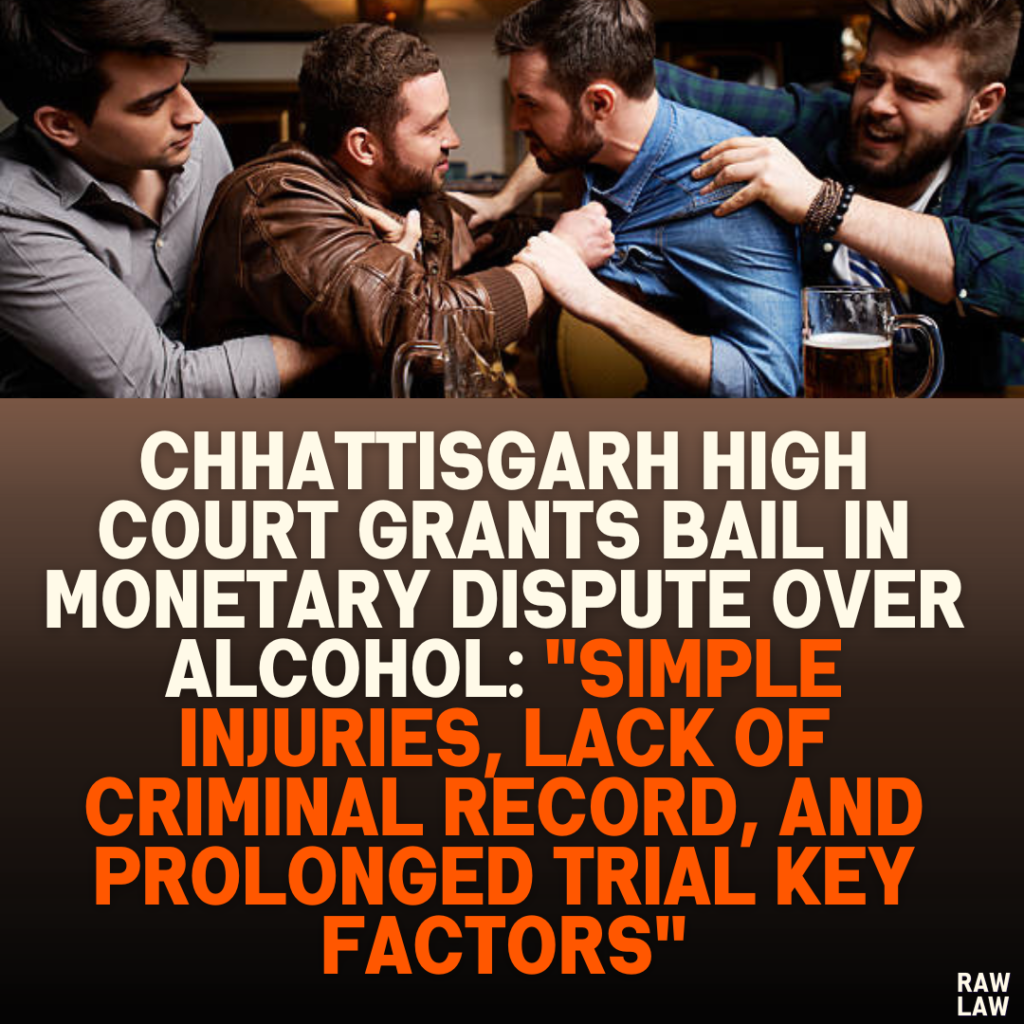Court’s Decision:
The Chhattisgarh High Court granted regular bail to the applicant under Section 483 of the Bharatiya Nagarik Suraksha Sanhita, 2023. The applicant faced charges under Sections 296 (voluntarily causing hurt), 351(2) (use of criminal force), 115(2) (abetment of crime), and 119(1) (offense against property) of the Bharatiya Nyaya Sanhita, 2023. The court considered:
- The simplicity of the injuries sustained by the complainant.
- The applicant’s lack of prior criminal antecedents.
- The protracted trial process, which would result in prolonged detention.
The court imposed strict conditions on the bail to ensure the applicant’s cooperation during trial proceedings.
Facts:
- Incident: A dispute arose when the applicant allegedly demanded money from the complainant to purchase alcohol. Upon refusal, the applicant is said to have physically assaulted the complainant.
- Injuries: The injuries were deemed simple in nature and not grievous.
- Arrest and Charges: The applicant was arrested on September 14, 2024, following the incident. A charge sheet was subsequently filed.
- Defense Claim: The applicant argued that he did not cause the injuries, which were attributed to another individual.
Issues:
- Should bail be granted given the allegations of assault during a monetary dispute?
- Do the simple nature of injuries and the absence of previous criminal conduct justify the applicant’s release on bail?
Petitioner’s Arguments:
- Innocence: The applicant claimed innocence, stating that he was falsely implicated due to mere suspicion.
- Dispute Context: He emphasized that the altercation was minor and involved no serious or premeditated violence.
- Injury Causation: The injuries were caused by another person, not the applicant.
- No Criminal History: The applicant has no prior criminal record.
- Detention Period: The applicant has been in custody since September 2024, with the trial expected to take a long time to conclude.
Respondent’s Arguments:
- Seriousness of Allegations: The State argued that the applicant assaulted the complainant during a dispute over money for alcohol, warranting his continued custody.
- Opposition to Bail: The State opposed the bail application, citing the need for accountability given the allegations.
Analysis of the Law:
- Sections Invoked: The court analyzed the applicability of Sections 296, 351(2), 115(2), and 119(1) of the Bharatiya Nyaya Sanhita, 2023, all of which pertain to causing harm or using criminal force in specific circumstances.
- Bail Provisions: Under Section 483 of the Bharatiya Nagarik Suraksha Sanhita, the court has discretion to grant bail, considering the nature of the offense, the accused’s conduct, and the likely timeline for trial completion.
- Nature of Injuries: The court noted that the injuries were classified as simple and not life-threatening.
Precedent Analysis:
While no specific prior cases were cited in the judgment, the court relied on established principles of law regarding bail, including the presumption of innocence and the proportionality of detention to the severity of the crime.
Court’s Reasoning:
- Nature of Injuries: The court emphasized that the injuries sustained by the complainant were minor and did not involve serious harm.
- Applicant’s Background: The applicant had no criminal antecedents, strengthening the argument for his release on bail.
- Delay in Trial: Acknowledging that trials can take a considerable time to conclude, the court found it unjust to keep the applicant in custody for an extended period.
- Bail Conditions: To mitigate concerns about misuse of liberty, the court imposed specific conditions to ensure the applicant’s attendance at trial and compliance with legal processes.
Conclusion:
The High Court granted bail to the applicant, subject to the following conditions:
- No Adjournments: The applicant must not seek adjournments when witnesses are present in court. Any such action could be treated as an abuse of bail.
- Mandatory Attendance: The applicant must be present at all trial dates, either personally or through counsel. Unexcused absence would invite proceedings under Section 269 of the Bharatiya Nyaya Sanhita.
- Compliance with Summons: The applicant must respond to any proclamations issued under Section 84 of the Bharatiya Nyaya Sanhita. Failure to do so would lead to further legal action under Section 209.
- Key Hearings Attendance: The applicant must appear in person for specific stages of the trial,
Implications:
This decision underscores the court’s balanced approach in granting bail based on the severity of allegations, the applicant’s background, and the nature of the injuries. It also reiterates the court’s commitment to ensuring trial proceedings are not delayed while upholding the applicant’s liberty under specified conditions.



